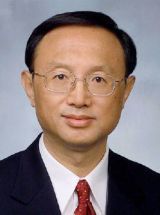China names new foreign minister
April 27, 2007 (BEIJING) — China named a former ambassador to the United States as foreign minister on Friday, replacing veteran diplomat Li Zhaoxing at a time when Beijing’s diplomatic clout is increasingly in the spotlight.

A polished English speaker, Yang takes the helm at a time when China is generating ripples across Asia and beyond, and his experience dealing with Washington could help smooth turbulence over trade, military modernisation and long-term ambitions.
“With such complex international developments at present, it’s all the more important for China and the U.S. to strengthen cooperation and jointly respond to terrorism, proliferation of weapons of mass destruction, regional conflicts and other challenges,” Yang said in a speech late last year, according to the foreign ministry’s Web site (www.fmprc.gov.cn).
His appointment was unlikely to bring big changes to policy, which is set by the ruling Communist Party’s leadership.
“In China, the foreign minister’s role is limited, certainly compared to the U.S. secretary of state. The minister implements more than he formulates policy,” said Yuan Tiecheng, a Beijing-based foreign policy researcher.
China’s President since 2003, Hu Jintao, has increasingly put his own mark on foreign policy, and at a meeting in August last year he demanded more coordination between domestic and diplomatic work. Yang will be in charge of realising that goal.
“He’s less nationalist than his predecessor,” Zhu Feng, an international security expert at Peking University, said of Yang.
“China’s rise is touching raw nerves in the U.S. and our relations with neighbours are complex. He’ll have to be a manager and a messenger managing that change.”
In the early 1970s, when China was isolated and consumed by Mao Zedong’s radical Cultural Revolution, Yang studied at the London School of Economics. Before that he had been a factory worker in Shanghai, a torrid epicentre of Maoist radicalism.
There had been speculation in Beijing that a history of heart trouble would undermine his hopes for the top job.
At 66, Li was widely expected to step down before or around a national parliamentary session next year. “Li Zhaoxing had already passed the age limit for his office,” Xinhua stated.
Li, who has dabbled in poetry, also served as ambassador to Washington.
Yang may be a smooth policy salesman, but he is no stranger to sparring with Washington. As vice minister, he hauled in U.S. diplomats to condemn Washington’s policies over Taiwan and Tibet.
As ambassador, Yang was “able to tread a fine line in both firmly defending China’s national interests and maintaining smooth and stable ties with the United States”, Xinhua reported.
He had recently arrived as ambassador when tensions spiralled over the crash of a Chinese fighter jet that collided with a U.S. surveillance plane. The U.S. crew landed on Hainan island in China’s far south and was freed by China after 11 tense days.
“But most of Yang’s experience with the United States has been when relations have been quite healthy,” said Shi Yinhong, a foreign policy expert at the People’s University of China.
“As a symbol, his appointment shows that China sees relations with the United States as crucial, no relationship matters more.”
China has been cultivating ties with its neighbours, including Japan and Russia, and is the host of negotiations aimed at ending North Korea’s nuclear weapons programme – all issues in which Washington has a big stake.
As well as announcing Yang’s elevation, China named new ministers of water resources, science and technology, and land and resources.
Separately, Xinhua said that Qian Yunlu had been selected as Communist Party chief of northeastern Heilongjiang province. Qian had previously been active in the Communist Youth League, which is widely seen as being President Hu Jintao’s power base.
The appointment adds to a growing number of local officials with ties to the organisation, which some analysts see as helping to consolidate Hu’s grip on power.
Other official changes are likely as the Communist Party prepares for a once in five years congress later this year.
(Reuters)
